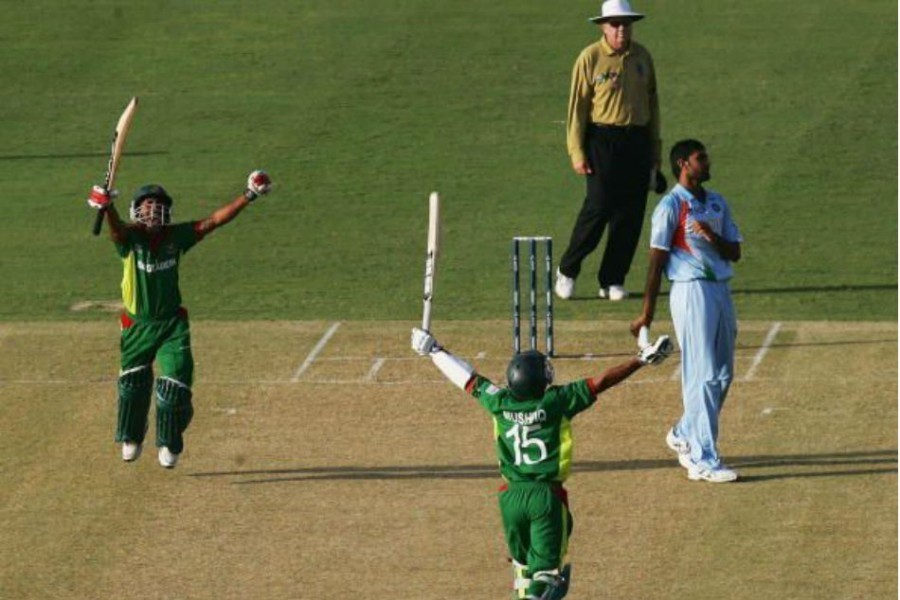Every time Shakib Al Hasan misses out on a series due to injury concerns or personal issues, the team management lose their mind while looking for a replacement. Admittedly, it is true that to find a replacement of a player like Shakib, who is basically a combination of two players in one, is undoubtedly a difficult thing.
Shakib made his international debut in 2006. That means Bangladesh has been enjoying his service for almost one and a half decade, and by this time, BCB (Bangladesh Cricket Board) should have developed an all-rounder like, or half as good as him to the least.
As for Mushfiqur Rahim and Tamim Iqbal, who made their debut in 2005 and 2007 respectively, it is the same as Shakib. BCB has not still found an opening partner for Tamim, let alone a replacement. Even though Liton Das and Nurul Hasan Shohan are good alternatives to wicketkeeper Mushfiq, they are nowhere near his substitute.
All these sum up Bangladesh Cricket’s sorry situation of its pipeline as well as its grim future after the retirement of Shakib, Tamim and Mushfiq.
The responsibility of ensuring substantial bench strength rests on the shoulder of the cricket board. BCB has a game development programmme to make sure fresh talents are identified and adequate opportunities with proper exposure are provided for their continuous improvement.
The game development programme maintains a HP (High Performance) team comprising uncapped players from U-19 team and domestic circuit with noteworthy potential and performance as well as international players dropped from the national side.
The objective of the HP team is to function as a bridge between the domestic level and the international level since the quality and competitiveness of cricket played in the international arena is significantly higher than that in our domestic leagues.
However, the effectiveness of the HP team has been under the scrutiny for quite some time. The selectors tend to run out of ideas to find a replacement even for a relatively new player who is out of touch, or forget about what may happen while trying to fill in the gap of a senior cricketer.
Recently, as Shakib Al Hasan was asked about the contribution of the HP team during an interview for an e-commerce brand on Facebook, he explained things quite boldly. “Not having back-up players is really disappointing. I don't know how many players have come from the High Performance squad. We hardly talk about these things. Even our journalists are focused on small things. They don't look at the big picture, like how many players we produced in the last five years,” he said.
To his great surprise at such an accusation by Shakib, the HP programme’s Chairman Naimur Rahman, also a former national captain, said, “In the last five years, a number of our Under-19 cricketers have come through the HP to play for the senior team. They recently beat Ireland Wolves. So, this is a surprising comment. I don't know if there's anything behind it.”
Even though Naimur’s claim is politically correct here, the number of players getting to wear the national colour from HP does not necessarily represent the success of the process.
As discussed before, the HP team comprises of top talents of the U19 national team, top performers of the domestic leagues NCL (National Cricket League), BCL (Bangladesh Cricket League), DPL (Dhaka Premier League), and BPL (Bangladesh Premier League), and finally the national team players who lose their position in the national side with every potential to regain that position if guided properly.
Since the HP team has the best players of the country, it is obvious that should there be any vacancy in the national team, someone from the HP squad has to be called upon as they are the best possible alternatives available. Therefore, the selection of a player from the HP squad should never be a measurement of success. Rather, the KPI (key performance indicator) for a HP team should be the performance of the players selected from it.
Once you take their performance as the KPI, you will see it is nothing but all doom and gloom for the HP team with no player having worth mentioning performance to raise the hope of taking over the baton from the senior players or to replace even the less established cricketers such as Liton and Soumya when they are out of form.
In such a scenario, focusing on the pipeline with proper long-term planning and execution is an ardent need should Bangladesh not want to follow in the footsteps of the Zimbabwe team with promising history languishing in the tier two of the World Test Championship and requiring to play qualification rounds for a spot in the ODI (One Day International) World Cups.
Ahmed Tanvir is currently studying at the Institute of Business Administration, University of Dhaka (IBA-DU). Email [email protected]


